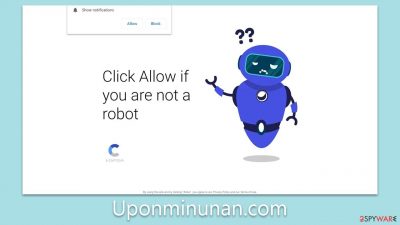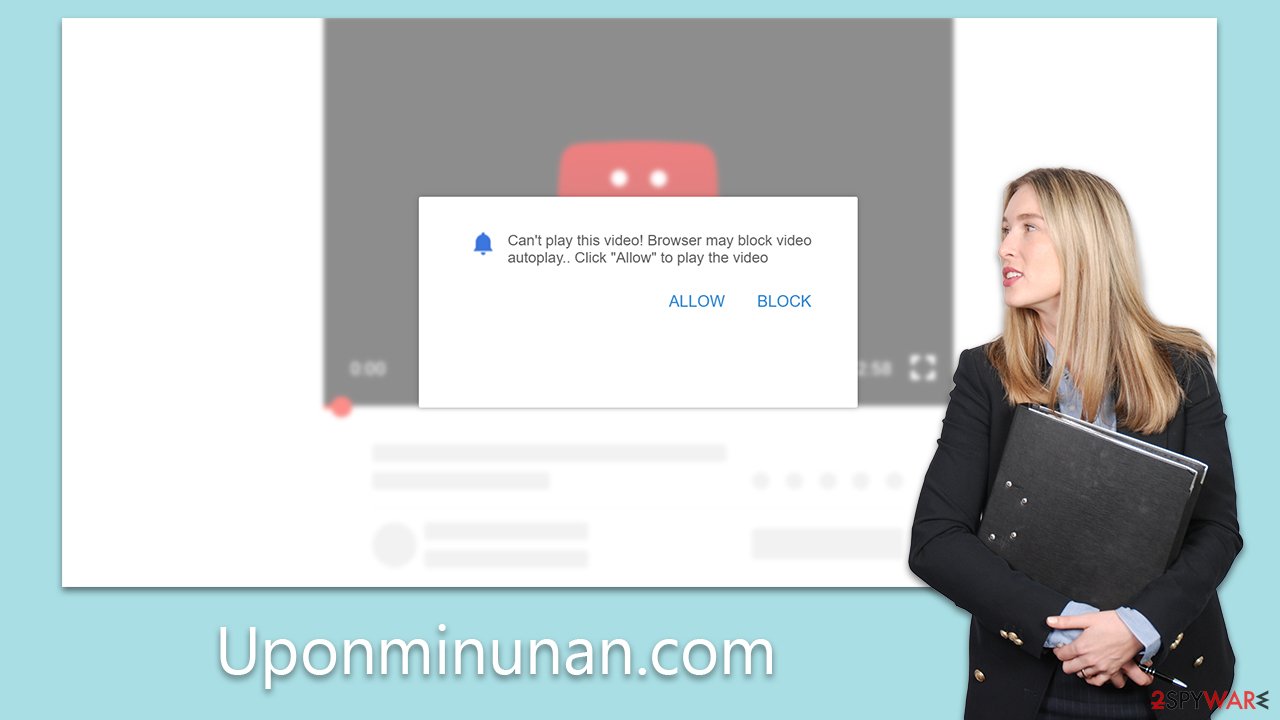Uponminunan.com ads (scam) - Free Guide
Uponminunan.com ads Removal Guide
What is Uponminunan.com ads?
Uponminunan.com is a malicious website made to scam people visiting it

Uponminunan.com is a deceptive website that utilizes push notification scam techniques to dupe unwary users into signing up for its push notifications. Similar to various sites of this kind, users might stumble upon the site incidentally during their online browsing sessions, irrespective of whether they use Google Chrome, Mozilla Firefox, MS Edge, or other browsers.
What distinguishes Uponminunan.com is its capacity to showcase obtrusive pop-up ads sporadically and directly on the user's desktop. For those unfamiliar with such scams, this can lead to both confusion and frustration.
The operating method of Uponminunan.com hinges on using deceptive messages to entice users into subscribing to their push notifications. Often, after being deceived, users may not be immediately aware of their actions since the push notifications might not appear right away. This delay can make it even more challenging for users to recognize and rectify the situation.
| Name | Uponminunan.com |
| Type | Push notifications, pop-ups, ads, scam |
| Distribution | The website gains access to deliver any information as soon as the “Allow” button is pressed within the push notification prompt |
| Symptoms | Pop-ups that are shown include fake notifications and push scams. Links can also direct you to sites filled with malware |
| Risks | Push notifications sent by the site might result in you visiting dangerous websites; consequently, you might suffer from malware infections, financial losses, or personal data disclosure to malicious parties |
| Removal | You can disable the push notifications from any website via browser settings. Scanning the system with SpyHunter 5Combo Cleaner can also ensure that it's clean and secure |
| Other checks | Use FortectIntego to clean your system from data trackers and fix any damage done by adware or other malicious software |
Scam techniques used
Users might inadvertently land on deceptive websites like Uponminunan.com, either due to adware infections on their systems or while navigating high-risk online territories. When on the site, individuals might encounter counterfeit prompts urging them to hit the “Allow” button in the notification permission pop-up that materializes at the top of their browsing window.
These fabricated prompts employ various misleading tactics to coax users into pressing “Allow.” They might suggest users need to affirm they aren't robots, attest to being above 18 years of age, or fill out a questionnaire to unveil the website's content. By leveraging urgency or piquing curiosity, these misleading cues manipulate users into giving consent without grasping the impending implications.
Crucially, such prompts lack authenticity and should be viewed with skepticism. By selecting “Allow,” users inadvertently empower Uponminunan.com to deliver push notifications, which in turn inundates them with undesired ads, deceptive schemes, and potentially harmful content. Such actions can culminate in a compromised browsing journey, monetary setbacks, or violations of personal privacy.
As a safeguard against such deceptive maneuvers, users should exercise caution when faced with notification permission requests. It's essential not to impulsively click “Allow” and instead rigorously assess both the site's trustworthiness and the justification given for the notification.
Malware exposure and other dangers
One of the most concerning implications of interacting with sites like Uponminunan.com is the potential exposure to malware and adware.
When users subscribe to push notifications from deceptive websites, they don't just open the door to unwanted advertisements. Some of these push notifications might contain disguised links leading to malicious websites or even initiate drive-by downloads. A drive-by download refers to the automatic downloading of software, often malicious, onto a user's device without their explicit consent or knowledge.

Once malware or adware is on a user's system, it can wreak havoc in various ways. Malware, which stands for malicious software, can include a variety of harmful programs, such as viruses, trojans, ransomware, and spyware. These can compromise the user's data, slow down or damage their device, steal sensitive information, or even grant cybercriminals unauthorized access to the infected system.
Adware, on the other hand, primarily focuses on bombarding users with unwanted advertisements. While it might seem less harmful than malware at first glance, adware can be more than just a nuisance. It can significantly degrade the user's browsing experience, redirect them to other potentially harmful sites, and, in some cases, monitor user activity to gather data for third-party entities.
In essence, subscribing to push notifications from dubious sources like Uponminunan.com doesn't just clutter one's device with unwanted ads. It poses a real threat to user security and the integrity of their device, making it crucial for users to be cautious about the sites they engage with and the notifications they subscribe to.
Check the system for infections
Individuals who get ensnared by push notification scams, like those from Uponminunan.com, might inadvertently render their devices susceptible to adware or other malicious entities. For effective eradication of such undesired software and to fortify your device, a comprehensive system scan using dependable anti-malware tools, for instance, SpyHunter 5Combo Cleaner or Malwarebytes, is advised. These utilities are adept at pinpointing and eliminating threats in an all-encompassing manner. Yet, prior to launching the scan, it's pivotal to ensure your security software's database is contemporaneous.
Post the successful obliteration of any looming threats, and it's prudent to cleanse your browsers and discard any lingering files that might pave the way for a resurgence of intrusive ads or unsolicited data surveillance by third parties. A credible computer maintenance tool, like FortectIntego, can be employed for this endeavor. Beyond merely erasing the remnants of malware-induced damage, this software also addresses other systemic anomalies, potentially averting grave issues like the infamous Blue Screen of Death or registry issues.
By adopting these preventive measures, you fortify your device against the detrimental aftermath of adware and other malicious entities. A routine system assessment, coupled with current security solutions and the use of a reliable computer maintenance tool, can considerably mitigate the chances of being trapped by push notification scams and the associated repercussions.
Removal of unwanted Uponminunan.com ads
Despite their occasionally questionable content, push notifications are inherently a part of your browser's built-in features, and the crux of the problem resides in the websites disseminating these notifications.
Thankfully, the ceaseless barrage of these undesirable alerts can be halted with a handful of tweaks in your browser preferences. In the following segment, we'll delineate a comprehensive guide to help you navigate this process and regain authority over the push notifications that come your way.
Google Chrome
- Open the Google Chrome browser and go to Menu > Settings.
- Scroll down and click on Advanced.
- Locate the Privacy and security section and pick Site Settings > Notifications.
- Look at the Allow section and look for a suspicious URL.
- Click the three vertical dots next to it and pick Block. This should remove unwanted notifications from Google Chrome.
![Stop notifications on Chrome PC 2 Stop notifications on Chrome PC 2]()
Google Chrome (Android)
- Open Google Chrome and tap on Settings (three vertical dots).
- Select Notifications.
- Scroll down to the Sites section.
- Locate the unwanted URL and toggle the button to the left (Off position).
![Stop notifications on Chrome Android Stop notifications on Chrome Android]()
Mozilla Firefox
- Open Mozilla Firefox and go to Menu > Options.
- Click on Privacy & Security section.
- Under Permissions, you should be able to see Notifications. Click the Settings button next to it.
- In the Settings – Notification Permissions window, click on the drop-down menu by the URL in question.
- Select Block and then click on Save Changes. This should remove unwanted notifications from Mozilla Firefox.
![Stop notifications on Mozilla Firefox 2 Stop notifications on Mozilla Firefox 2]()
Safari
- Click on Safari > Preferences…
- Go to the Websites tab and, under General, select Notifications.
- Select the web address in question, click the drop-down menu and select Deny.
![Stop notifications on Safari Stop notifications on Safari]()
MS Edge
- Open Microsoft Edge, and go to Settings.
- Select Site permissions.
- Go to Notifications on the right.
- Under Allow, you will find the unwanted entry.
- Click on More actions and select Block.
![Stop notifications on Edge Chromium Stop notifications on Edge Chromium]()
Internet Explorer
- Open Internet Explorer, and click on the Gear icon at the top-right of the window.
- Select Internet options and go to the Privacy tab.
- In the Pop-up Blocker section, click on Settings.
![Stop notifications on Internet Explorer Stop notifications on Internet Explorer]()
- Locate the web address in question under Allowed sites and pick Remove.
How to prevent from getting adware
Do not let government spy on you
The government has many issues in regards to tracking users' data and spying on citizens, so you should take this into consideration and learn more about shady information gathering practices. Avoid any unwanted government tracking or spying by going totally anonymous on the internet.
You can choose a different location when you go online and access any material you want without particular content restrictions. You can easily enjoy internet connection without any risks of being hacked by using Private Internet Access VPN.
Control the information that can be accessed by government any other unwanted party and surf online without being spied on. Even if you are not involved in illegal activities or trust your selection of services, platforms, be suspicious for your own security and take precautionary measures by using the VPN service.
Backup files for the later use, in case of the malware attack
Computer users can suffer from data losses due to cyber infections or their own faulty doings. Ransomware can encrypt and hold files hostage, while unforeseen power cuts might cause a loss of important documents. If you have proper up-to-date backups, you can easily recover after such an incident and get back to work. It is also equally important to update backups on a regular basis so that the newest information remains intact – you can set this process to be performed automatically.
When you have the previous version of every important document or project you can avoid frustration and breakdowns. It comes in handy when malware strikes out of nowhere. Use Data Recovery Pro for the data restoration process.






